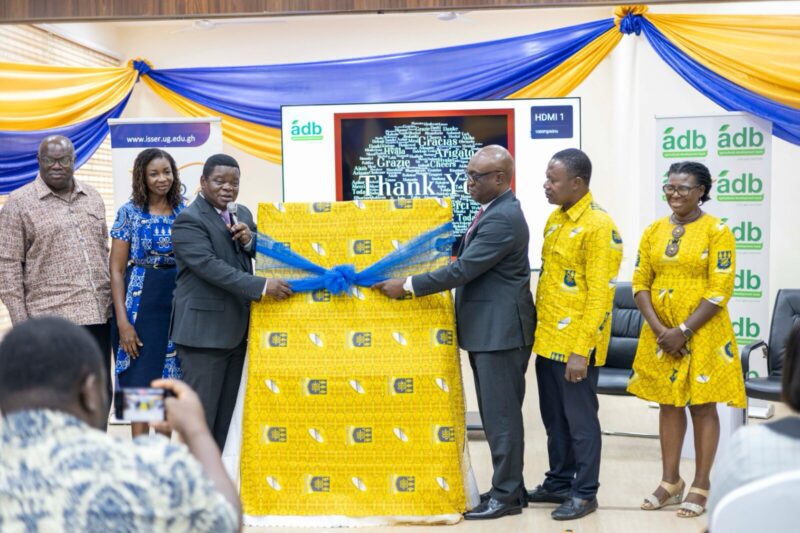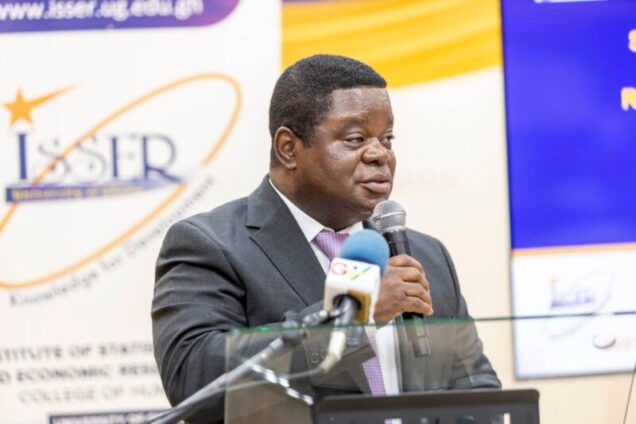The Institute of Statistical, Social and Economic Research (ISSER) has published its State of the Ghanaian Economy Report 2023 and Q3 2024 Performance Review.
It reveals critical insights into Ghana’s economic landscape, with an emphasis on the untapped potential of property rates to boost tax revenue.
The report urges the country to strengthen local tax mobilisation and leverage technology to bridge fiscal gaps and reduce reliance on debt.

According to the report, Ghana’s tax-to-GDP ratio remains well below average at 12.3% in 2022, increasing slightly to 13.64% in 2024.
This is significantly lower than the roughly 20% tax-to-GDP ratio seen in countries such as Botswana, Morocco, Mozambique, Senegal, and South Africa.
“Ghana’s tax capacity is low, as evidenced in its low tax-to-GDP ratio,” the report states, underscoring that “the capacity to mobilize taxes is at the heart of nation-building”

Property tax collection has been highlighted as a largely untapped resource. In most of Ghana’s Municipal and District Assemblies (MMDAs), property taxes account for only 3% of revenue.
ISSER contends that inadequate property tax mobilization places unnecessary strain on local government budgets, with MMDAs overly dependent on central government transfers, primarily through the District Assemblies Common Fund (DACF), which contributes 42% of their revenue.
“An appropriately designed and deployed technology can significantly boost property rate collection, reduce reliance on central government transfers, and promote local development,” the report notes.

The report warns that Ghana’s low tax revenue cycle perpetuates underdevelopment by restricting investment in essential infrastructure and services.
This, in turn, forces the government to resort to debt financing, with interest payments comprising the largest expenditure in the 2023 budget at 25.6%.
ISSER states that “this reliance on debt has contributed to recent economic instability,” making Ghana increasingly vulnerable to external shocks.

To address these issues, ISSER advocates for robust IT systems to increase tax collection efficiency and oversight.
The report cites a pilot program in the La Nkwantanang Madina Municipal Assembly, where a technology-based Enhanced Revenue Mobilisation System (ERMS) increased property tax collection by 103% through a geospatial database and real-time tracking capabilities.
However, the report cautions that such technology must be implemented with strong management practices to avoid misuse and ensure equitable tax collection.
The event was chaired by Isaac Tetteh, the CEO of BigPay Ghana Limited. Also in attendance is Emeritus Prof Aryeetey and the Registrar of the University, Mrs Emelia Agyei-Mensah
Latest Stories
-
NAPO commissions library to honour Atta-Mills’ memory
3 mins -
OmniBSIC Bank champions health and wellness with thriving community walk
4 mins -
Kora Wearables unveils Neo: The Ultimate Smartwatch for Ghana’s tech-savvy and health-conscious users
9 mins -
NDC supports Dampare’s ‘no guns at polling stations’ directive
11 mins -
Police officer interdicted after video of assault goes viral
29 mins -
KNUST’s Prof. Reginald Annan named first African recipient of World Cancer Research Fund
30 mins -
George Twum-Barimah-Adu pledges inclusive cabinet with Minority and Majority leaders
1 hour -
Labourer jailed 5 years for inflicting cutlass wounds on businessman
1 hour -
Parliament urged to fast-track passage of Road Traffic Amendment Bill
1 hour -
Mr Daniel Kofi Asante aka Electrician
1 hour -
Minerals Commission, Solidaridad unveils forum to tackle child labour in mining sector
1 hour -
Election 2024: Engagement with security services productive – NDC
1 hour -
Retain NPP for the good of Ghana – Rebecca Akufo-Addo
1 hour -
‘Let’s work together to improve sanitation, promote health outcome’ – Sector Minister urges
1 hour -
Ellembelle MP cuts sod for six-unit classroom block at Nkroful Agric SHS
2 hours

